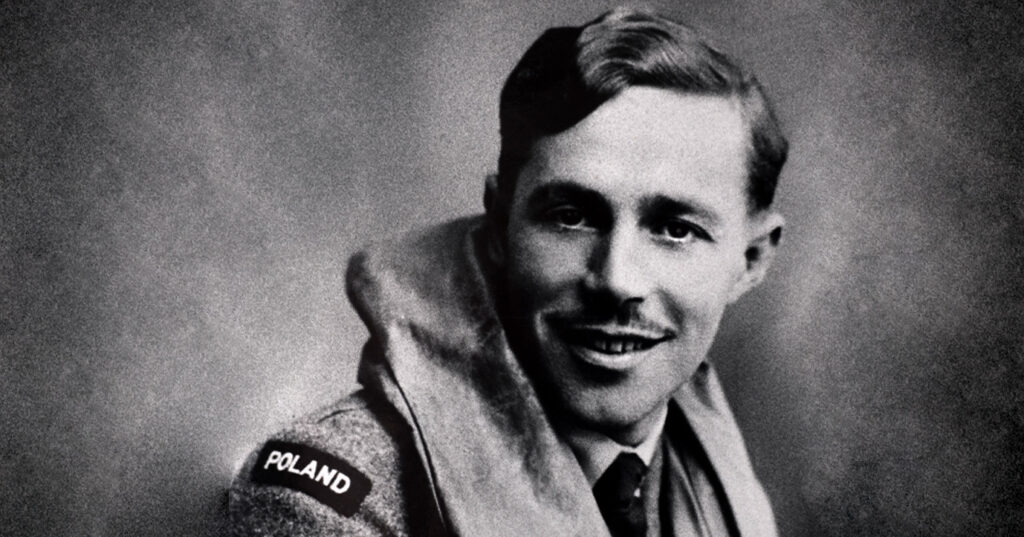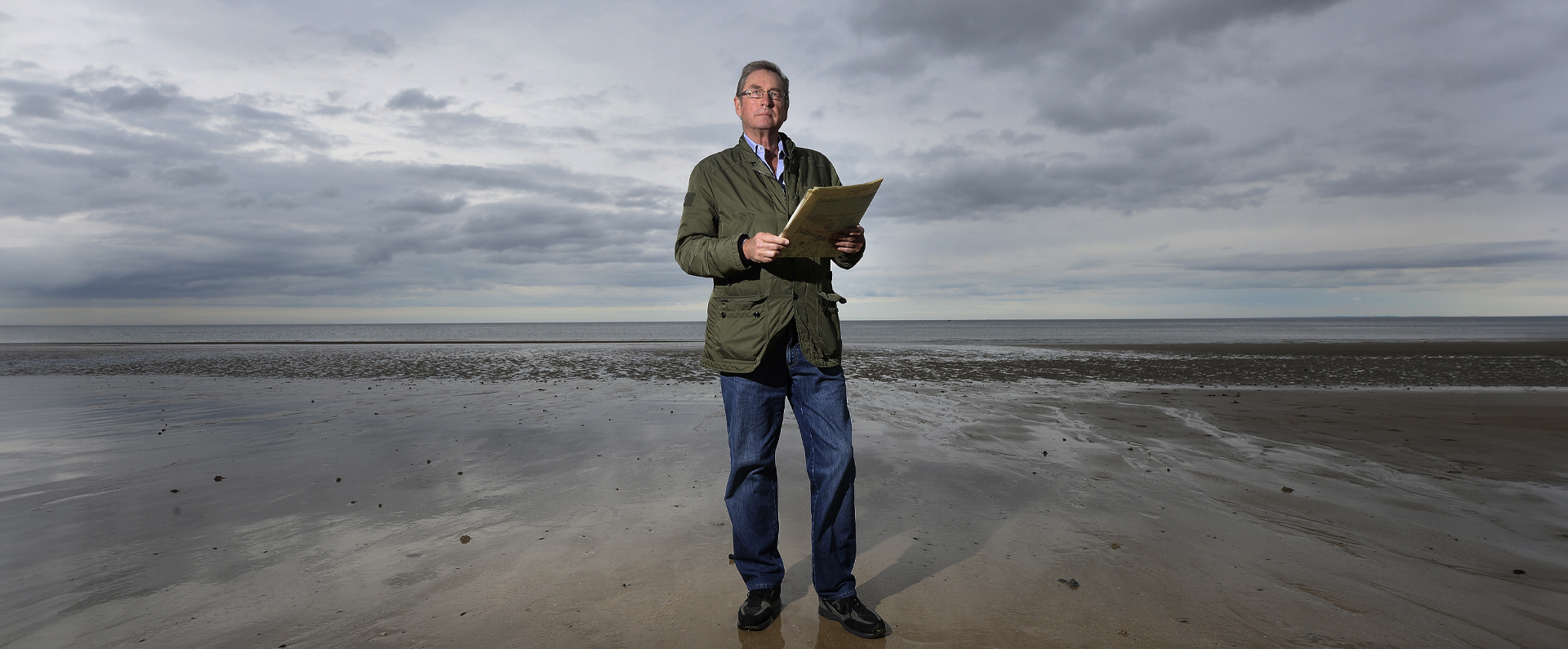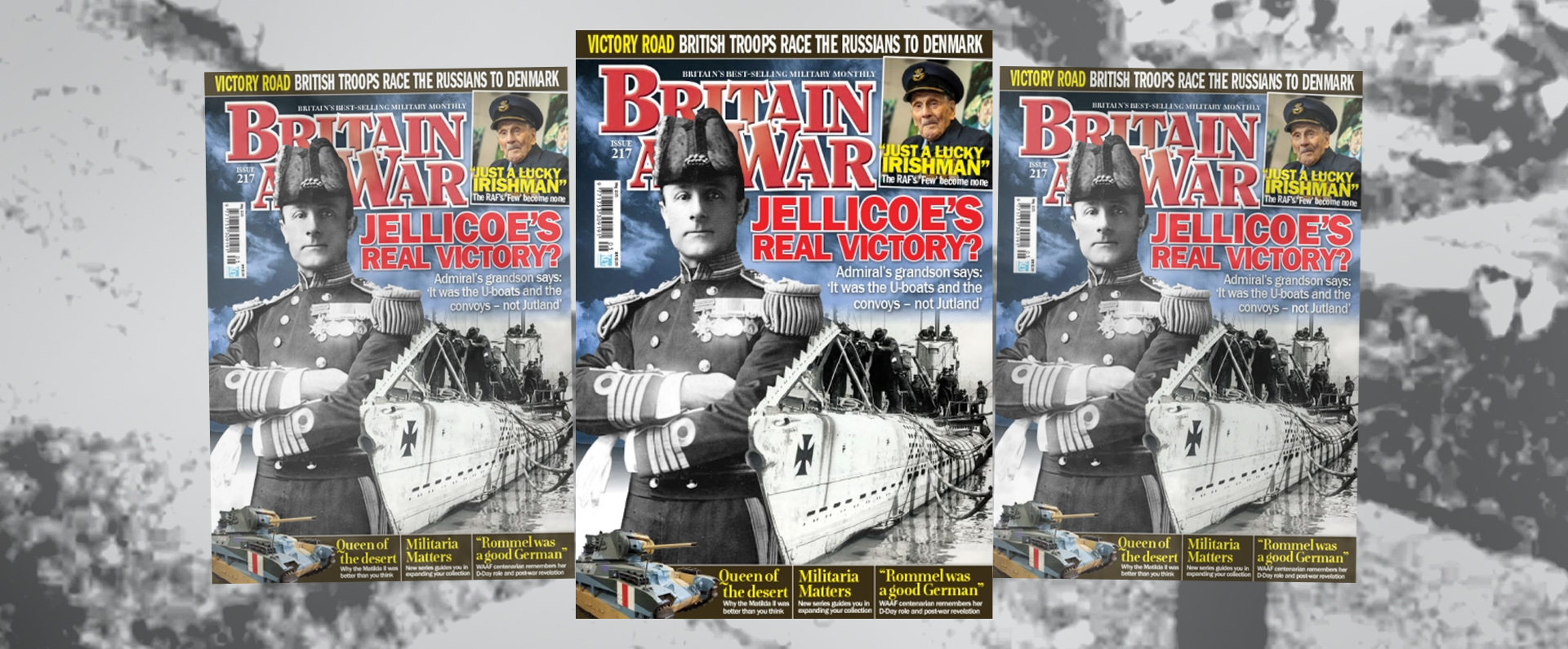
Published in Britain at War in October 2022.
Flight Lieutenant Michal Miroslaw Karol Maciejowski DFC, DFM
I have long had a huge admiration for the Polish servicemen who fought with Britain and its allies to try to regain their homeland during the Second World War. Scores of these brave men served with the RAF having already learnt to fly with the Polish Air Force prior to their country being invaded by Hitler’s Army.
Few Polish airmen serving in the RAF between 1939 and 1945 were more courageous or more skilful than Michal Maciejowski, diminutive in stature but a formidable opponent in the skies. Furthermore, I am delighted to say that I am the proud custodian of this wonderful man’s gallantry and service medals.
Affectionately known as “Mickey Mouse” by his British comrades, because they struggled to pronounce his surname correctly, he was awarded both the Distinguished Flying Medal (DFM) and the Distinguished Flying Cross (DFC) during a dazzling wartime career.
Michal Miroslaw Karol Maciejowski is believed to have been born in Poland in the town of Gródek Jagdowski on October 29 1913. After he finished his secondary education, his family moved to Poznan, where he entered St. Mary Magdalene College, graduating in 1931. He then enrolled in the Department of Chemistry of the University of Poznan while carrying out flying training in the Polish Air Force Reserve.
Maciejowski was mobilised in August 1939 and posted to 3 Aviation Regiment in Poznan but apparently did not fly operationally due to a shortage of aircraft. After serving as an instructor, he was transferred to a bomber squadron. In late 1939, during the fall of Poland, he was ordered to fly to Romania to escape being detained by the Germans.
He was interned in Romania for a short time before travelling by sea to Syria, where he arrived in January 1940. Another journey by ship took him to Marseilles in southern France. From there, he was sent to the Polish air base at Lyons for posting to a fighter squadron.
However, before France too fell in June 1940, he flew to Britain and was soon posted to RAF Eastchurch, Kent. His initial brief was to learn English and to familiarise himself with British aircraft.
Experienced RAF pilots were initially cautious of their Polish counterparts fearing they would not be up to the job. Flight Lieutenant “Johnny” Kent, who was posted to No. 303 (Polish) Fighter Squadron during the Battle of Britian, summed up the feeling of many in his memoirs: “All I knew about the Polish Air Force was that it had only lasted about three days against the Luftwaffe, and I had no reason to suppose that they would shine any more brightly operating from England.” His opinion of them soon changed.
It was shortly after arriving in Britain that Maciejowski became known affectionately as “Mickey Mouse”, a name that stuck for the rest of the war and was particularly apt given he was only 5 ft 4 ins tall.
In September 1940, after training on Hurricanes, Maciejowski was posted to 111 Squadron at North Weald, Essex, and in October 1940 he was transferred to 249 Squadron. On October 15 1940, he was involved in what he later called an “embarrassing moment” when he could not find his trousers as he “scrambled” at 5 a.m. still dressed in his pyjamas.
After a dogfight over Kent, his engine failed and he later wrote: “I glided toward mother earth and landed in a meadow near an army barracks. A few farmers and army personnel came and thought that I was a German pilot in a stolen Hurricane. With my command of pidgin English, I made myself understood and gave them my squadron number and airfield.
“We became friends when it was confirmed that I was a Polish pilot. Later that afternoon the mechanic fixed whatever was wrong – I took off, and was on duty with the same aircraft later the same day.”
As already indicated, Maciejowski’s efforts were only a small part of the contribution by Polish airmen to the war effort. A total of 145 experienced and battle-hardened Polish airmen fought in the Battle of Britain: 79 airmen in various RAF squadrons, 32 in No. 302 (Polish) Fighter Squadron and 34 in No. 303 (Polish) Fighter Squadron.
One of the finest examples of their work was a remarkable feat accomplished by Sergeant Antoni Glowacki, of 501 Squadron. On August 24, he claimed five enemy aircraft, which were shot down in three combat sorties during the one day. He was one of only three pilots who are believed to have achieved “ace-in-a-day” status during the Battle of Britain.
Maciejowski’s exploits in the air during the Battle of Britain and beyond also left a favourable impression: he claimed a Me 109 fighter destroyed on October 29, another one on November 7, together with two “probables” on the same day and another “probable” on November 28. He ended the year with another “probable” on December 5, followed by the confirmed destruction of two Me 109s on January 10 and February 10 1941.
Upon the formation of 317 (Polish) Squadron on 22 February 1941, Maciejowski was posted to the unit where he claimed a “probable” Ju 52 bomber on May 22.
Maciejowski was awarded the Polish Cross of Valour and Bar on April 1 1941 and a second Bar to the award on July 15 1941, together with the DFM on October 30 1941. The latter award was based on the recommendation of Wing Commander F. V. Beamish, of RAF North Weald, Essex, which stated: “This Pilot NCO has proved to be a cool and determined fighter pilot who always shows a calm yet extremely resolute intention of destroying the enemy. His courage and example are admired by all ranks. He has destroyed five enemy aircraft besides damaging several others.”
There were still many more adventures to come. On December 30 1941, he claimed two Me 109s destroyed and on May 5 1942 he was awarded the Virtuti Militari (5th class).
In June 1942, Maciejowski was commissioned and he saw heavy combat action over Dieppe on August 19, claiming a Ju 88 and a Fw 190 destroyed and a Do 217 shared destroyed. On August 25, he was posted to 58 Operational Training Unit (OTU) Grangemouth, Stirlingshire, Scotland, as an instructor.
On November 15 1942, Maciejowski was awarded a third Bar to his Cross of Valour and also the DFC. The latter award was based on the recommendation of Group Captain A. S. Adnams, of RAF Northolt, Middlesex, which stated: “This officer fought with an English Squadron in the ‘Battle of Britain’ and then joined his present Squadron. Recently commissioned, he was the outstanding victor of the Polish Wing in the operations over Dieppe on 19th August, 1942.
“In this operation he brought his personal score up to 9½ enemy aircraft destroyed and one probably destroyed, by the destruction of an enemy bomber and an enemy fighter aircraft, sharing in the destruction of a further enemy bomber. Since the award of the Distinguished Flying Medal, he has destroyed a further 4½ enemy aircraft, and he has at all times shown the greatest determination to engage and destroy the enemy.”
Maciejowski returned to operational flying on March 23 1943, when he joined 316 Squadron at Northolt. He probably destroyed a Fw 190 and damaged another on May 4 and on June 11 he destroyed a Me 109. Having survived every encounter with enemy aircraft, he was, ironically, finally brought down over Occupied France in a mid-air collision with a fellow Allied pilot on August 9 1943.
The Spitfire of the other pilot, Flying Officer Lech Kondracki, broke up as it dropped from the skies and the airman, unable to open his parachute in time, was killed.
Maciejowski was forced to bale out at 23,000 feet and suffered his only injury of the war: part of his ear was torn off and then frostbite set into the wound. He was taken Prisoner of War (PoW) and held at Stalag Luft III, where he took part in tunnelling for the “Great Escape”. However, he was not one of those who exited the tunnel and he was instead repatriated in May 1945 after Germany surrendered.
Maciejowski was a real character and, in their book about Stalag Luft III, Escape to Danger, Paul Brickhill and Conrad Norton devoted a chapter to him. They wrote: “The nickname [Mickey Mouse] was remarkably apt because it conveyed all the sense of a diminutive knight errant, chockful of guts, skill and a puckish, appealing wit – which was Mickey all over.
“He was a bare 5ft. 4ins., topped by a close-fitting cap of dark, wiry hair, and built like a baby tank, sprouting knotty muscles from hefty shoulders and slightly bandy legs…He has eleven and a half victories, three probables and several damaged, and his fighting career was quite spectacular until a stroke of fiendish luck put him behind the wire.”
Even though Maciejowski’s wartime flying ended on August 9 1943, he still emerged as Poland’s seventh highest scoring ace for the Second World War. All of his “kills” were made while operating from Britain.
Maciejowski returned to flying duties in June 1945 and attended a refresher course at 16 Flying Training School (FTS), Newton, Nottinghamshire. From there, he was posted on November 11 to 309 Squadron based at RAF Coltishall, Norfolk. Maciejowski remained with the squadron until it was disbanded on January 6 1947.
Unlike many of his fellow Polish pilots, Maciejowski did not return to his homeland after the war. Instead, he settled in Britain, changing his name to “Michael Manson”.
After the war, he wrote of his early days flying with the RAF: “What I remember most of those days was fast-flowing adrenaline, scores of eager young men, some boys of bigger hearts than their awareness of the danger of a short life, quiet sadness and continuity of efforts and purpose of those who survived.”
Maciejowski rejoined the RAF in June 1951 and flew as a test pilot until, in 1958, he was ruled to be too old to fly. However, the RAF remained loyal towards him and offered him ground duties: he chose catering because he “wanted to learn to cook”.
In 1963, Maciejowski formally transferred to the catering branch and three years later he was put in charge of supply in Aden, in the Middle East, during the troubles. By 1970, he was running the RAF Transit Hotel in Malta.
Maciejowski retired still in the rank of flight lieutenant in 1972 and, soon afterwards emigrated to Winnipeg, Canada, where he enjoyed a full and happy retirement. He died in Winnipeg on April 26 2001, aged 87. What a life, what a man.
Download a PDF of the original Britain At War article.
For more information, visit:
LordAshcroftOnBravery.com

